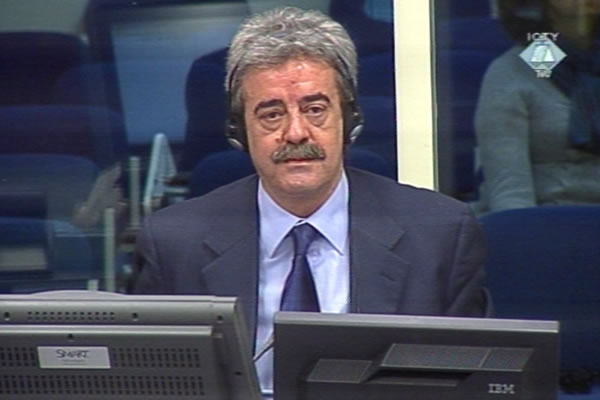Home
MOMIR BULATOVIC AND ‘TIME OF MADMEN’
In his previous statements, former Montenegrin president and federal prime minister Momir Bulatovic claimed that the Bosnian Serbs had committed crimes. Now, as he testified in the defense of Radovan Karadzic, Bulatovic tried to relativize his previous views, saying there was no systematic plan for ethnic cleansing. As he explained, it was a ‘time of madmen’: paramilitaries who couldn’t be forced inside a legal framework
 Momir Bulatovic, defence witness of Radovan Karadzic
Momir Bulatovic, defence witness of Radovan Karadzic Prosecutor Uertz Retzlaff continued her cross-examination of the former Montenegrin president and FRY prime minister Momir Bulatovic. She noted that the Belgrade authorities supported the Bosnian Serb leadership headed by the accused Radovan Karadzic although they were aware that the Bosnian Serbs were responsible for war crimes. The prosecutor reminded the witness of the many statements he and other FRY officials made during and after the war.
At a Supreme Defense Council meeting in March 1993, Bulatovic said that the federal authorities were obliged to help Republika Srpska, adding that it was difficult to cooperate with someone like the entity’s prime minister Vladimir Lukic who proposed that the Serb police should ethnically cleans Sandzak and kill local Muslims. The witness first said that it was an isolated opinion of one of the Bosnian Serb leaders. In the re-examination by the accused, the witness said he didn’t even know if Lukic had actually said something like that or it was ‘hearsay’. The witness didn’t want to comment on the fact that at one of the SDC meetings, the Chief of the VJ General Staff Momcilo Perisic called the Bosnian Serb Army a ‘Chetnik army’. Bulatovic claimed that this view ‘didn’t prevail’ at the meeting.
In an interview for the BBC TV program, Death of Yugoslavia, Bulatovic described how he travelled to Pale once during the war and he noticed that all the Muslim villages in Republika Srpska had been burned down, while 100 or 200 meters away, in Serb villages, life went on as if there had been no war. ‘Yes, that is the war, it is unfair to all’, Bulatovic replied, adding that in other parts of BH the situation was diametrically opposite: there, Serb villages were burned down.
The prosecutor showed the minutes from a meeting of the FRY Council for State Policy Coordination in August 1992. At the meeting, Prime Minister Milan Panic said that ‘ethnic cleansing [conducted by the Bosnian Serbs] shouldn’t be financed’. The Chief of the General Staff Zivota Panic added that ‘when Serbs enter a Muslim village in BH, they kill everyone, including the children and old men’. Bulatovic admitted that the gravest crimes against civilians had already been committed by that time, but denied that there was a systematic plan for the ethnic cleansing. Bulatovic noted that Panic went on to say something along those lines a bit later: Karadzic told Panic that the crimes, including the shelling of Sarajevo, were committed by ‘gangs of criminals’ he had no control over. ‘It was a time of madmen that you couldn’t fit into legal frameworks’, the witness concluded. Bulatovic meant the paramilitaries when he used the term ‘madmen’.
In his statement to the defense, Bulatovic denied that the unification of all Serb territories was ever a goal. In response to this claim, the prosecutor showed the transcript of Momcilo Krajisnik’s speech at a meeting of the Council for Coordination in January 1993, when he said, ‘now it is possible to unite the territories of Serbia, Montenegro, Republika Srpska and the Republic of Serbian Krajina into a single state’. According to the witness, this vision ‘did not prevail’ and the unification wasn’t mentioned in the conclusions from the meeting. There were ‘realists and idealists’ and on that occasion realists’ argument that the unification was not possible won the day, Bulatovic explained.
Linked Reports
- Case : Karadzic
- 2013-02-28 PRESIDENT DEFENDING PRESIDENT
- 2013-02-27 ‘IMPLAUSIBLE’ AND ‘LESS IMPLAUSIBLE’ SREBRENICA ALLEGATIONS
- 2013-02-26 A WITNESS FOR ALL SEASONS
- 2013-03-04 NEUTRAL BUT ON SERB SIDE
- 2013-03-05 WITNESS HEARD A LOT, KNEW LITTLE
- 2013-03-06 NOBODY EXPELLED MUSLIMS AND THEY SHELLED THEMSELVES
